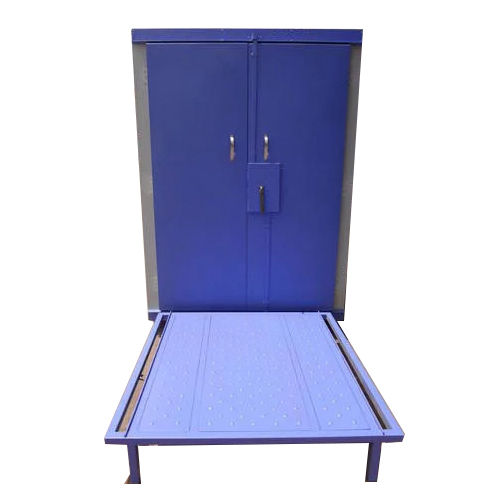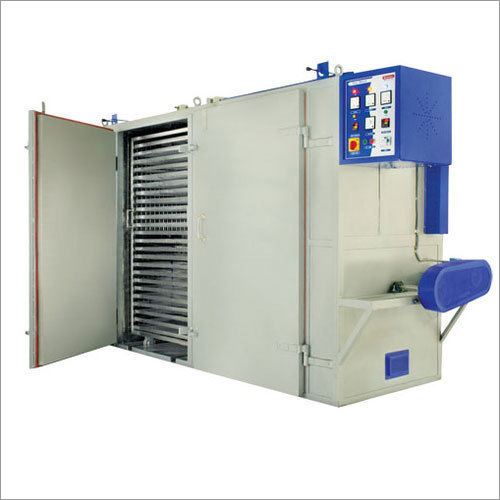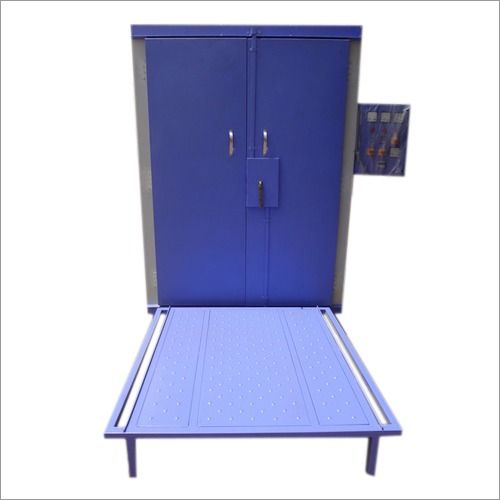Call Us
08045814219
Tray Dryer
1 INR/Unit
Product Details:
- Power 230 V Volt (v)
- Temperature 40 to 150 Celsius (oC)
- Heat Source Electric / Steam / Oil / Gas
- Fuel Type Electricity, Steam, Oil, Gas
- Usage Laboratory
- Material Mild Steel
- Voltage 220 V / 380 V / 415 V Volt (v)
- Click to view more
X
Tray Dryer Price And Quantity
- 1 INR/Unit
- 1 Piece
Tray Dryer Product Specifications
- 1 Year
- 40 to 150 Celsius (oC)
- Laboratory
- Electricity, Steam, Oil, Gas
- Blue
- Electric / Steam / Oil / Gas
- 230 V Volt (v)
- Tray Dryer
- 220 V / 380 V / 415 V Volt (v)
- Hot Air Circulation (forced convection)
- Mild Steel
Tray Dryer Trade Information
- Cheque
- All India
Product Description
The Tray Dryer is a highly efficient drying device made to accommodate the requirements of several sectors, including pharmaceutical, food-processing, chemical, and research laboratories. It provides an effective option for drying a variety of materials and goods because of its durable design, dependable performance, and adaptable drying capabilities. To accomplish effective and consistent drying, the Tray Dryer combines forced-air circulation and convection. The materials placed on the trays are quickly and consistently dried because hot air is pumped throughout the drying chamber. Consumers may change and regulate a variety of drying factors with the Tray Drying Equipment to match their unique needs.
Applications of Tray Dryer:
1. Drying Fruits and Vegetables: Tray dryers are often used in the food industry to dry fruits, vegetables, and herbs to extend their shelf life.
2. Drying Snack Foods: Various snack foods like chips, crackers, and extruded snacks can be dried using tray dryers.
3. Drying Pharmaceuticals: Tray dryers are commonly employed in the pharmaceutical industry to dry pharmaceutical products, including tablets, capsules, and granules.
4. Herb and Plant Drying: Tray dryers are used for drying herbs and plants for medicinal purposes.
5. Drying Chemicals: In the chemical industry, tray dryers can be used for drying various chemicals, including powders and granules.
6. Drying Specialty Chemicals: Specialty chemicals and intermediates can be effectively dried using tray dryers.
7. Drying Dyes and Pigments: Tray dryers are utilized in the textile industry for drying dyes and pigments.
8. Drying Fabrics and Textile Materials: Some processes in textile manufacturing require the drying of fabrics and other materials, and tray dryers can be employed for this purpose.
9. Drying Ceramic Products: Tray dryers are used in the ceramics industry for drying ceramic products such as tiles, pottery, and sanitary ware.
10. Laboratory Drying: Tray dryers are employed in laboratories for experimental drying of small quantities of materials, supporting research and development activities.
11. Seed Drying: Tray dryers are used for drying seeds in agriculture to maintain their viability and prevent spoilage.
12. Drying Wood Products: Tray dryers can be used in the wood industry for drying wood chips or other wood products.
13. Drying Minerals: Some minerals and ores may be dried using tray dryers as part of the processing and preparation steps.
14. Drying Plastic Resins: Tray dryers are utilized in the plastics industry for drying plastic resins before processing.
15. Water Removal from Various Substances: Tray dryers can be used for general water removal from substances, helping to reduce moisture content.
Tray Dryer FAQ:
Q. What is a tray dryer?
Ans: A tray drying equipment is a type of drying equipment used to dry and dehydrate materials. It typically consists of a series of trays or shelves where the material is placed for drying.
Q. How does a tray dryer work?
Ans: This equipments work by circulating hot air through the trays, facilitating the drying process. The trays are stacked vertically, allowing for efficient use of space.
Q. What types of materials can be dried using a tray dryer?
Ans: Tray drying equipments are versatile and can be used to dry a wide range of materials, including food products, pharmaceuticals, chemicals, textiles, ceramics, seeds, wood, minerals, and more.
Q. What are the key components of a tray dryer?
Ans: The main components of a tray dryer include trays or shelves, a heating system (electric or steam), a circulation fan, and controls for temperature and airflow.
Q. What is the temperature range of tray dryers?
Ans: The temperature range of tray drying equipment can vary depending on the specific model and application. It typically ranges from ambient temperature to around 200 degree centigrade.
Q. How do you control the drying process in a tray dryer?
Ans: The drying process in a tray dryer is controlled by adjusting parameters such as temperature, airflow, and drying time. Modern tray dryers often come equipped with digital controllers for precise control.
Q. What are the advantages of using a tray dryer?
Ans: Advantages of tray dryers include uniform drying, space efficiency, versatility, ease of loading and unloading, and the ability to handle small to large batches of materials.
Q. Can a tray dryer be used for laboratory purposes?
Ans: Yes, these equipments are commonly used in laboratories for small-scale drying experiments and research purposes.
Q. Are there any safety considerations when using a tray dryer?
Ans: Safety considerations include proper ventilation to handle exhaust air, ensuring that the trays are loaded evenly to maintain balance, and following manufacturer guidelines for temperature and operation.
Q. How do I clean and maintain a tray dryer?
Ans: Regular cleaning and maintenance involve removing any residue from previous drying cycles, inspecting trays for damage, checking the heating elements, and ensuring proper airflow.
Q. Can a tray dryer be used for heat-sensitive materials?
Ans: Yes, tray drying equipment can be used for heat-sensitive materials by controlling the drying temperature and ensuring that it stays within the acceptable range for the particular material.
Q. What are common troubleshooting issues with tray dryers?
Ans: Common issues may include uneven drying, insufficient airflow, temperature fluctuations, and equipment malfunctions. Troubleshooting involves checking components like fans, heaters, and controls.
Tell us about your requirement

Price:
Quantity
Select Unit
- 50
- 100
- 200
- 250
- 500
- 1000+
Additional detail
Mobile number
Email
Other Products in 'Tray Dryers' category
We are dealing only in North India (West Bengal, Andhra Pradesh, Bihar, Chandigarh, Chhattisgarh, Dadra and Nagar Haveli, Daman and Diu, Goa, Gujarat, Haryana, Madhya Pradesh, Maharashtra, Uttar Pradesh, Rajasthan, Uttarakhand)
.







